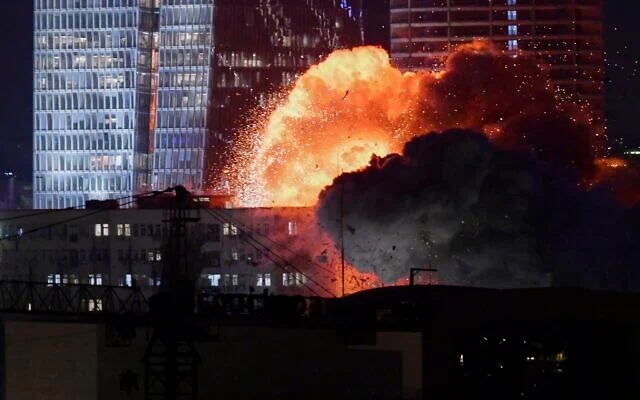The Middle East spiraled deeper into conflict on Friday night as Iran launched a large-scale ballistic missile attack called Operation Burning Palm on Israel in direct retaliation for Israeli airstrikes that targeted critical nuclear and military infrastructure across Iran, including facilities in Natanz, Fordo, and Isfahan.
Explosions echoed across Tel Aviv, Jerusalem, and other Israeli cities as dozens of Iranian missiles pierced the night sky. Israel’s Iron Dome and allied regional missile defense systems intercepted most projectiles, but at least a handful struck residential neighborhoods, resulting in widespread damage and civilian injuries.
Israeli Casualties and Emergency Response
Israeli emergency services reported at least three fatalities and over 80 injuries, with several individuals critically wounded in the Gush Dan metropolitan area, which includes Tel Aviv and surrounding suburbs. Among the casualties were victims pulled from collapsed buildings in cities like Rishon Lezion and Ramat Gan.
A senior official with Magen David Adom (MDA), Israel’s emergency response agency, said: “We have been responding to missile impact sites throughout central Israel. The damage is severe in some locations, and several lives have been lost.”
Footage and images from the ground showed burnt-out vehicles, shattered glass, and apartment buildings with entire facades blown off. Smoke trailed above Tel Aviv’s skyline as interception debris and missile fragments fell into populated areas.
Also read: Is this the Spark for World War III? Israel’s ‘Operation Rising Lion’ on Iran Explained
Iran’s Retaliation: “The Beginning of Our Crushing Response”
Iran’s official news agency, IRNA, declared the attack was “just the beginning” of a decisive response to what it called Israel’s “savage aggression” on Iranian soil. The Islamic Revolutionary Guard Corps (IRGC) claimed it had launched hundreds of ballistic missiles, targeting what it described as Israeli military-industrial zones and strategic defense centers.
Iran’s Supreme Leader, Ayatollah Ali Khamenei, vowed that Israel would face “a bitter and painful fate” and warned against further Israeli aggression.
“This regime cannot strike our scientists, generals, and cities without facing consequences. The Iranian nation will no longer tolerate hit-and-run operations,” Khamenei said in a national address.
The Preceding Israeli Offensive
The Iranian attack followed Israel’s massive, coordinated aerial and cyber assault early Friday morning on more than 100 targets deep inside Iran. Using warplanes and previously smuggled drones, the Israeli Defense Forces (IDF) claimed it struck nuclear enrichment sites, missile production facilities, and killed key military commanders, including General Mohammad Bagheri, IRGC chief Gen. Hossein Salami, and missile program head Gen. Amir Ali Hajizadeh.
Israeli Prime Minister Benjamin Netanyahu described the operation as a “preemptive strike” aimed at halting Iran’s nuclear weapons program, adding, “More is on the way.”
“This regime does not know what hit them or what will hit them. Israel is not fighting the Iranian people but the dictatorship that has oppressed them for 46 years,” Netanyahu said in a televised address.
Global Reactions and Escalation Fears
The United Nations Security Council convened an emergency session at Iran’s request, with multiple nations warning of the risk of full-scale regional war.
U.S. officials confirmed that American and allied air defense systems in the region had assisted Israel in intercepting Iranian missiles. However, the White House reiterated that it had not been involved in the planning or execution of Israel’s initial offensive.
U.S. President Donald Trump, now serving his second term, issued a statement urging Iran to return to nuclear negotiations or risk “the total loss of what was once known as the Persian Empire.”
Countries across the Gulf and Europe called for de-escalation, while regional players like Hezbollah offered rhetorical support to Iran but stopped short of immediate involvement.
What’s Next: Tensions on a Knife’s Edge
Despite widespread destruction and loss of life, both Iran and Israel have hinted that the current exchange may not be the final chapter. Israeli officials warned of “unbearably heavy” retaliation if Iran continues targeting civilian areas, with unnamed sources suggesting energy infrastructure and leadership targets inside Iran could be next.
The IDF has mobilized reserve forces and bolstered defenses nationwide. Meanwhile, Iranian proxies in Lebanon, Iraq, and Syria have reportedly been placed on high alert.
As the world watches anxiously, a fragile region teeters on the edge of a potentially catastrophic war, one that could drag in superpowers and destabilize the Middle East for years to come.








